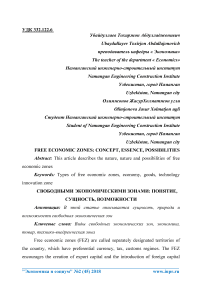Free economic zones: concept, essence, possibilities
Автор: Ubaydullayev T.A., Olimjonova Ja.X.
Журнал: Экономика и социум @ekonomika-socium
Статья в выпуске: 2 (45), 2018 года.
Бесплатный доступ
This article describes the nature, nature and possibilities of free economic zones
Types of free economic zones, economy, goods, technology innovation zone
Короткий адрес: https://sciup.org/140236265
IDR: 140236265
Текст научной статьи Free economic zones: concept, essence, possibilities
Free economic zones (FEZ) are called separately designated territories of the country, which have preferential currency, tax, customs regimes. The FEZ encourages the creation of export capital and the introduction of foreign capital into services and industry, as well as commercial and other entrepreneurial activities, which are joint with foreign capital.
Free economic zones are an inseparable part of economic relations at the international level. This system of relations is strongly entrenched in world practice. SEZ in the world system of economic relations is a significant factor of rapid economic growth, which is achieved through various activities: the exchange of information and technologies, the deepening of integration economic activities, the mobilization of investment, the activation of world trade.
The objectives of the formation of free economic zones:
-
• Establishment of production and introduction on the domestic market of import-substituting goods that are of high quality;
-
• development of best practices, organization and management of personnel, training of employees, development of various models of management systems by the economy, development of the functional side of individual economic entities in the market environment;
-
• intensification of the rapid growth of the export potential of the economic zone;
-
• encouraging the economic development of the regions surrounding the territory of the free economic zone with the use of foreign capital.
The creation of suitable conditions makes the free economic zones an important factor in the country's economic development, which accelerates the incorporation of the national economy into world economic relations, and also stimulates the development of the country's economy as a whole. In fact, SEZs act as poles of economic growth. This is an active tool for managing external economic ties at the level of regional policy and state level.
Types of FEZ in terms of functionality:
-
• Offshore zones where preferential tax, currency, registration and banking conditions for foreign citizens are created on the intentionally allocated territories;
-
• complex production zones, which are organized, first of all, for export production of consumer goods that do not require material-intensive costs;
-
• Technopolis and technology parks, which are organized with the focus on the creation and development of innovative technologies;
-
• foreign trade zones where there can be a combination of duty-free trade and development of transport, warehouse services and export production.
The reasons for the formation of free economic zones.
SEZs are created in industrialized countries in regions with economic decline with the aim of restoring medium and small businesses and thus balancing interregional differences. The enterprises of such regions receive the maximum tax privileges. Free economic zones - an instrument of regional policy, which is used in those areas of countries where an increase in the economic level is required, as well as the level of social welfare.
When selecting a region for the establishment of a free economic zone, measures such as the income level of the population of the region and the level of unemployment are used.
Developing countries, in contrast to industrialized countries, make the main emphasis on achieving a higher level of industrialization: improving the industry, attracting foreign capital, building up the skills of workers, introducing new technologies.
Список литературы Free economic zones: concept, essence, possibilities
- Адашев А. Ў. КОРХОНАЛАРДА ИННОВАЦИОН РИВОЖЛАНИШИНИНГ ТАРКИБИЙ АСОСЛАРИ//Научное знание современности. -2017. -№. 4. -С. 8-12.
- Адашев А. У., Аскаралиев А. СОВРЕМЕННЫЕ ПОДХОДЫ К ПОКАЗАТЕЛЯМ И ЦЕННОСТЯМ ЭКОНОМИЧЕСКОГО РАЗВИТИЯ//Теория и практика современной науки. -2017. -№. 2. -С. 28-30.
- Шакирова Г. Ш. Повышение эффективности корпоративного управления на предприятиях в условиях модернизации экономики//Молодой ученый. -2014. -№. 8. -С. 635-636.
- Шакирова Г. Ш. Некоторые вопросы совершенствования корпоративного управления в Узбекистане//Молодой ученый. -2015. -№. 10. -С. 848-850.
- Шакирова Г. Ш. Мотивация труда работников в сфере деятельности малого бизнеса и частного предпринимательства//Молодой ученый. -2016. -№. 11. -С. 1074-1076.
- Шакирова Г. Ш. МИЛЛИЙ ИҚТИСОДИЁТ ТАРАҚҚИЁТИДА ХОРИЖИЙ ИНВЕСТИЦИЯЛАРНИНГ ЎРНИ//Научное знание современности. -2017. -№. 4. -С. 405-407.


